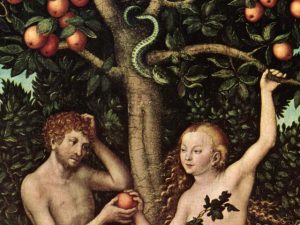
I don’t want my kids to be born with a red button on their forehead that I push every time I want to hear them say, “I love you Daddy!” I want them to choose to say it from their own free will. No one wants a robot son or daughter – God included.
But even knowing God created us with a free will, wasn’t there something he could have done to keep Man from sinning? Why did he allow this evil deed that brought alienation and death into the world? My friend Jimmy Akin did some pondering after reading a paragraph in the Catechism of the Catholic Church. He wrote,
Today something leapt out that deals with the problem of evil, even though it wasn’t in the section on the problem of evil. It deals with the question of why God allowed original sin to take place.
Here’s what it says:
CCC 412 But why did God not prevent the first man from sinning? St. Leo the Great responds, “Christ’s inexpressible grace gave us blessings better than those the demon’s envy had taken away.” and St. Thomas Aquinas wrote, “There is nothing to prevent human nature’s being raised up to something greater, even after sin; God permits evil in order to draw forth some greater good. Thus St. Paul says, ‘Where sin increased, grace abounded all the more’; and the Exsultet sings, ‘O happy fault,. . . which gained for us so great a Redeemer!’”

This does not necessarily mean a greater good for every individual (e.g., people who commit mortal sin and decide to stay there may not end up with a greater benefit in the long run, although this is itself arguable), but it does mean that there will be greater net good in general.
Thinking of Jimmy’s words reminded me of another paragraph in the Catechism which has caused quite a stir at times. It deals with the divinization of us humans. Had we not sinned, God would presumably not had to become Man. But when God became Man, though his humanity he drew us up into himself and made it possible for us to be sharers in his nature, to share in the very life of the Trinity!
CCC 460 The Word became flesh to make us “partakers of the divine nature”: “For this is why the Word became man, and the Son of God became the Son of man: so that man, by entering into communion with the Word and thus receiving divine sonship, might become a son of God.” “For the Son of God became man so that we might become God.” “The only-begotten Son of God, wanting to make us sharers in his divinity, assumed our nature, so that he, made man, might make men gods.”
This is not some strange kind of Mormon theology or New Age nonsense. It is the essence of our salvation. We are not just saved from our sins, but we are drawn right up into the very nature of God by the incarnation and redemption acquired through Jesus Christ.
St. Peter reminds us in 2 Peter 1:4, “He has granted to us his precious and very great promises, that through these you may escape from the corruption that is in the world because of passion, and become partakers of the divine nature.”
If you are not dancing yet, re-read the above and then start dancing and sharing this joyous news with everyone!!



This Post Has One Comment
What a great post for the season. Salvation history started with Adam and Eve and our first rejection of God’s love. His eternal creations have a choice. Let’s pray that most will make the right one.
Comments are closed.